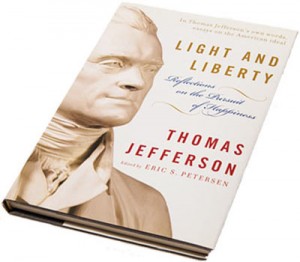Thomas Jefferson is of course known worldwide as the author of the American Declaration of Independence and its third President, but beyond that, he was an an authority on subjects ranging from architecture to botany – and human happiness. At a lecture in the United Nations building in New York on ‘The Vision of Thomas Jefferson’, Jefferson scholar Eric Petersen had this to say about Jefferson:
Thomas Jefferson was the happiest of men. He said, “The Giver of life gave it for happiness and not for wretchedness.” Everywhere he went, he sang or hummed happily to himself. The fiddle, or the violin, was his instrument, and he was quite accomplished. As a collegian, he played in the governor’s weekly ensembles at the palace in Colonial Williamsburg. And in his sunset years, the music of his grandchildren filled the parlor of his home at Monticello, in Charlottesville, Virginia.
Thomas Jefferson said the sun never caught him in bed for fifty years. He loved nature and nature’s God. He delighted in the culture of the earth and in every bud that opened. He loved being outdoors. He spent every possible moment outside, regardless of the weather. Even when he was inside, he was conscious of the beauty, the flow, the power and the peace of nature. He once wrote “there is not a sprig of grass that shoots uninteresting to me, nor anything that moves.” ((The full lecture can be viewed on the lightandliberty.org site))
 Eric Petersen is the editor of Light and Liberty: Reflections on the Pursuit of Happiness, a unique compilation of Thomas Jefferson’s writings drawn from over 20,000 letters and other works written by Thomas Jefferson. Among the 34 chapters contained inside the book is a very incisive chapter entitled ‘Happiness’, excerpts from which are included below. (Mr. Petersen and his wife Kathryn also narrate the epilogue of the Jewels of Happiness audiobook, which is also called ‘Happiness’.)
Eric Petersen is the editor of Light and Liberty: Reflections on the Pursuit of Happiness, a unique compilation of Thomas Jefferson’s writings drawn from over 20,000 letters and other works written by Thomas Jefferson. Among the 34 chapters contained inside the book is a very incisive chapter entitled ‘Happiness’, excerpts from which are included below. (Mr. Petersen and his wife Kathryn also narrate the epilogue of the Jewels of Happiness audiobook, which is also called ‘Happiness’.)
Thomas Jefferson on Happiness:
Be assiduous in learning, take much exercise for your health, and practice much virtue. Health, learning, and virtue, will insure your happiness; they will give you a quiet conscience, private esteem, and public honor. Beyond these, we want nothing but physical necessaries and they are easily obtained.
Happiness is the aim of life. Virtue is the foundation of happiness. Utility is the test of virtue. If the wise be the happy man, as the sages say, he must be virtuous too; for, without virtue, happiness cannot be. Interesting occupations are essential to happiness. Indeed, the whole art of being happy consists in the art of finding employment. A mind always employed is always happy. This is the true secret, the great recipe, for felicity. The idle are the only wretched. The Giver of Life gave it for happiness and not for wretchedness.
All men are endowed by their Creator with inherent and inalienable rights; among these, are life, liberty, and the pursuit of happiness. Perfect happiness, I believe, was never intended by the Deity to be the lot of one of His creatures in this world; but that He has very much put in our power the nearness of our approaches to it, is what I have steadfastly believed.
Service
Nothing makes me more happy than to render any service in my power, of whatever description. There are minds which can be pleased by honors and preferments; but I see nothing in them but envy and enmity. It is only necessary to possess them, to know how little they contribute to happiness, or rather how hostile they are to it. Honesty, disinterestedness, and good nature are indispensable to procure the esteem and confidence of those with whom we live, and on whose esteem our happiness depends.
Happiness and Government
The only orthodox object of the institution of government is to secure the greatest degree of happiness possible to the general mass of those associated under it.
How soon the labor of men would make a paradise of the whole earth, were it not for misgovernment, and a diversion of all his energies from their proper object—the happiness of man,—to the selfish interests of kings, nobles, and priests. If we can prevent the government from wasting the labors of the people, under pretense of taking care of them, they must become happy. We who have gone before have performed an honest duty, by putting in the power of our successors a state of happiness which no nation ever before had within their choice.
If, in my retirement to the humble station of a private citizen, I am accompanied with the esteem and approbation of my fellow citizens, trophies obtained by the blood-stained steel, or the tattered flags of the tented field, will never be envied. The care of human life and happiness and not their destruction, is the first and only legitimate object of good government. We wish the happiness and prosperity of every nation.

